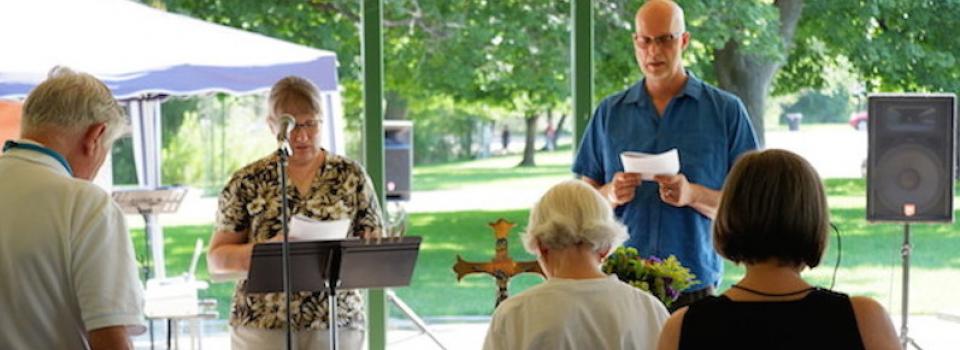Pastoral Ponderings-August-2019
Pastoral ponderings . . . .
It is one of the most familiar of all Jesus’ parables: someone is beaten and robbed, left for dead. Religious leaders see him, and walk on by. But the man from the other side of the tracks, the outsider, the heretic Samaritan, sees a perfect stranger in desperate need; and takes him under his wing, sparing no cost until he is well enough to travel again.
Which one was the neighbor? Jesus asks. The one who acted with compassion, is the answer. Christian ethics, are the ethics of compassion plain and simple. Compassion that sees a need and acts, not counting the cost. Compassion that heals, because that’s what Christ does. But we have other more popular ethics that are far more convenient, and much less expensive: Survival of the fittest. Every man for himself. God helps those who help themselves. These would be alternatives to the ethics of Christ.
“Good fences make good neighbors”was a saying that came out of cattle country in the late 19th century. A “good neighbor” today, is now defined by many of us white Americans as someone we don’t have to see, much less interact with, if we don’t want to.
Jesus’ parables are meant to not only draw us closer to him, but also to turn the tables on us. Just when we thought the answer to all questions on our southern border could be found by building a bigger, better, stronger wall, by sending in the military, and abolishing asylum altogether, Jesus’ pesky question about neighbors, and how he defines neighbor as “the one who acts with compassion,”sends us back to the drawing board.
It’s so heart-breaking to hear about the Facebook page with over 10,000 followers who make fun of what they are calling “The Floaters”; people driven by desperation, like the father and his 2 year old daughter who drown trying to escape oppression we will never know. “And who is my neighbor” the young aspiring follower of Jesus asks the Lord.
A better translation is “And who could possibly be my equal?” In this guy’s mind, there’s no one more successful, well educated, or law-abiding than him. Might you know anyone like that? There are more than we’d care to count today, with personally-tailored religions, and ethics to match. In think that in the Good Samaritan parable, Christ is calling them out.
“Who is the Christ in the parable?” For the one bleeding to death on the road, or dying of thirst in the desert, or drowning in the Rio Grande, Christ must be the one who finally stops and shows such compassion, kindness, and generosity. Think of those who have shown us compassion in the hour of our greatest need. Who were they? Maybe they were there in the ER with you, or the operating room. Maybe they were the ones who donated blood. Maybe they were ones who brought food, or mowed the lawn;
or watched our kids, or kept our sorrows in their confidence? Christ is always showing up in those who show us compassion in the hour of our greatest need, like the Good Samaritan.
But Christ is also the innocent victim! The one who says, when we see the poor, we see Him. For the successful, the religious, the law-abiding passersby in the parable,
Christ is surely the innocent victim: beaten and robbed, lying in the road, and they do nothing to get involved. Too complicated. Too expensive. Too inconvenient.
Parables always have that element of hyperbole in them: who wouldn’t stop to help someone bleeding to death in the street? How could anyone pass by? Who wouldn’t stop?
The First Responders who run into the burning building, the Hot Shots who take on the most dangerous fires, the watchful parent who sees someone else’s child sinking un-noticed under the water, and dives in. . .all are practicing the ethics of Christ. It’s hard to comprehend how anyone could see someone in danger, and do nothing.
“Who is my neighbor; who could possibly be my equal?” is the question asked of Jesus. Do we define them only as our own flesh and blood? Those who live on our block? Are they only the people with the right documentation? A valid drivers’ license? A Social Security number? If we were to name our neighbors, we might exclude anyone whose name we didn’t know, or couldn’t pronounce. We might exclude the stranger, the outsider, the one without the right documentation. Today our nation has a very exclusive definition of who our neighbor is, or should be. But Jesus’ way turns our definitions upside-down. He teaches that God’s reign of compassion and lovingkindness is for all people alike. And I believe the God we worship calls us as Christians to a higher ethical standard; a standard that includes all people as neighbor, regardless of status, race, creed, gender, or sexual orientation. His way of being in the world identifies all people as our neighbor. Jesus’ ethic of all-inclusive compassion is called the ethic of “neighbor love” in the ELCA. It’s a guiding principle in the formation of many of the Social Statements of the ELCA.
Jesus’ story of the Good Samaritan was absolutely shocking in its day. He was announcing something new, something foreign to human society up to then; a new society that he called “the reign or kingdom of God.” I think it’s the way God wants to renew and re-create human society. God’s ways are inclusive, not exclusive. God’s reign of love is expanding our understanding of who belongs, who has a place, and who is welcome. And I hope that the longer we follow Christ, trying to walk in his ways, the more we will be converted to the ethics of neighbor-love: converted from exclusive thinking and acting, to inclusive ways of living the reign of God and the ethics of neighbor- love, here and now, in the USA. – Pr. David


